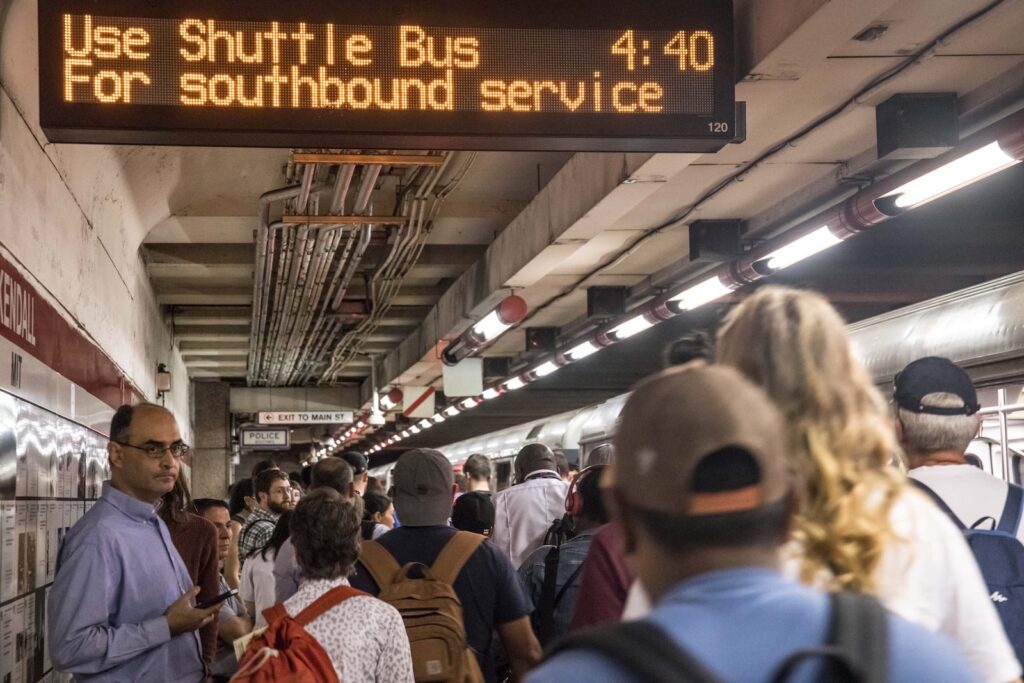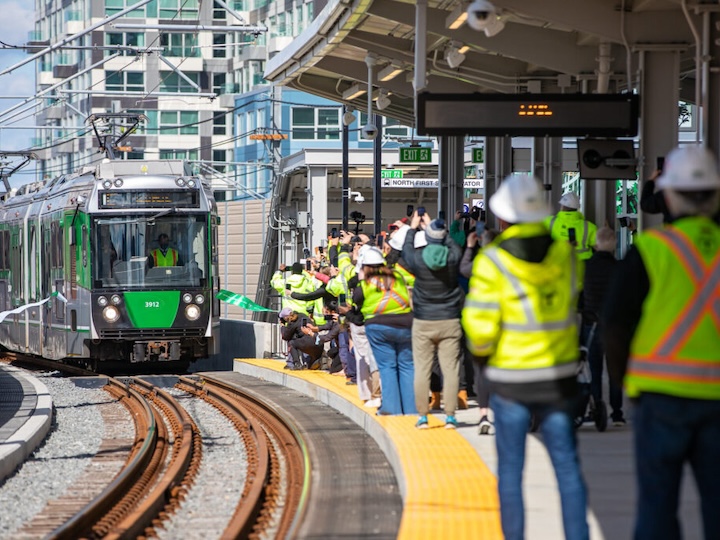It’s not just an MBTA problem. “Roadmap for Equitable and Sustainable Transportation Action in Massachusetts” warns: “The current state of transportation is unsustainable”
The 53-page report doesn’t sugarcoat anything. It even starts on a depressing note: “Today, people in Massachusetts experience some of the worst traffic congestion in the country.”
And then it gets even worse: “More than half of the state’s population live in communities served by the Commonwealth’s 15 regional transit authorities (RTAs). However, those RTAs are so underfunded that some communities do not have service in the evenings …
“Only recently did all agencies expand to offer service 7 days a week.”
That’s one of the few positive notes in Funding Our Future: A Roadmap for Equitable and Sustainable Transportation Action in Massachusetts, a new report out this week from the Transit Is Essential coalition. Thoroughly reported and backed by more than 40 organizations spanning Transit Matters, Walk Massachusetts, and Livable Streets, to Conservation Law Foundation, Boston Center for Independent Living, and MassBike, the overall assessment is clear: “The current state of transportation is unsustainable for our climate and public health, our economy, and ultimately for the people of Massachusetts.”
Massachusetts Transit System Faces Critical Challenges: 2024 Coalition Report
There’s not much hopeful Bay State transit news of late beyond some recent sunshine sown by Phillip Eng, the general manager and CEO of the Massachusetts Bay Transportation Authority (MBTA). Eng’s prioritizing rail work to reduce the number of slow zones has been widely applauded, but larger funding nightmares still loom, and 2025 is taking a sharp turn toward Elm Street. The new coalition report cites Christian MilNeil of StreetsBlog Mass in emphasizing the extent of the imminent problem: “If the legislature does not take action early in 2025, the MBTA will be facing a roughly 700 million dollar operating deficit in FY26.”
But while a devastating historical assessment published by the MBTA advisory Board in November—Always Broke: Governing and funding public transportation in and around Boston 1918 – 2024—details how we got to this point and the wrong turns taken by all parties, from officials to management, the Transit Is Essential piece looks to funding our future, also the title of the coalition’s findings.
“Massachusetts needs a new transportation funding model that provides ample and sustained revenue that is equitably sourced and distributed, that can meet the needs of our transportation systems today, and appropriately resource the transportation system we need for tomorrow.
“The good news is that viable and fair solutions are out there. States across the US have already passed comprehensive transportation funding packages that we can learn from. Grassroots, civic, and business leaders have already offered the legislature several potential funding ideas. The problem may be large, but we have the tools to solve the problem.”

Key Goals Of The 2024 Transit Report
This report was a big haul, and it shows, with specific data as well as relevant anecdotes sprinkled throughout. Public transportation advocates in particular often discuss how problematic it can be when lawmakers and others who have a direct impact on policy don’t experience bad transit themselves. Nothing can compare to the real thing, but for anyone who hasn’t lived through it, this presentation showcases the grassroots in ways that state and federal evaluations, while important, rarely manage.
In order to get that personal touch, Transportation for Massachusetts (T4MA), which is “focused on improving Massachusetts’ transportation systems,” “embarked on a robust statewide outreach that included visiting communities across the Commonwealth.” The “effort to democratize the way we come up with our policy priorities” included launching “a Policy Council with representation from various social justice areas, launching two learning series on transportation, and traveling through different modes of transportation with community members all over the state.”
Importantly, they’re not only impugning Greater Boston problems. The authors of Funding Our Future want to “Make sure that transit works for everyone, regardless of where they live.” The report states, “Pitting people who live outside of the MBTA region against those who live in Metro-Boston creates false tradeoffs. Every transit authority in Massachusetts is underfunded, and thousands of people, regardless of where they live, need better transit options.”
Examples from other transit systems
In order to move forward, the report’s authors argue, Massachusetts needs to shed some baggage. For example, “Misunderstanding about how roads, bridges and transit are currently funded, assumptions about how large (or small) certain revenue streams are, and assumptions about how money is or isn’t spent has often led to an over-focus on less impactful funding options that don’t meet our long-term needs.”
The report notes that the 2022 “Fair Share” amendment to the State Constitution, which created a 4% surtax on personal income over $1 million, isn’t saving the day, but is an “important part of the Commonwealth’s transportation funding future,” and “delivered on its promise and raising $2.2 billion in Fiscal Year 2024.” Recognizing that there “is not a single revenue source or strategy that on its own will fill budget gaps and make our transportation systems whole,” the coalition identified examples from other states that, if put in place in Mass, could help begin to reduce deficits. For example, “Minnesota’s 2023 Transportation law includes a $7.8 billion in revenue, $3.7 of which is new revenue sources, for 2024-2026.”
New York, meanwhile, “is investing $12 billion in statewide transportation projects through a mix of fees and taxes. The package includes raising the payroll mobility tax to raise an additional $1.1 billion annually.” And Colorado’s most recent transportation funding package “invests $5.4 billion, with $3.8 billion in new revenue for 10 years from 2022-3032.” That one “includes a $0.27 delivery fee that will apply to orders, including those made online, for goods and most other items subject to sales tax.”
Recommendations for “equitable and sustainable” transportation funding
The report lays out four major recommendations for an “approach toward building a transportation revenue package” that will: “Have an equitable financial impact on people in Massachusetts”; “Provide stable short-term and long-term revenue options”; and “Help the state meet its mobility, climate and public health goals.”
The first recommendation is to “Focus on more equitable and sustainable revenue options first.” Some “Examples of more equitable sources of transportation revenue the legislature should prioritize include”: “New corporate minimum tax tiers”; and “Eliminating special exemptions, deductions or credits that reduce the value of taxes on personal income or corporate profits.”
Second, the report suggests the state “Ensure low and moderate income individuals are not overburdened with paying for the transportation system.” While the third recommendation, “Include policies and revenue options that allow for local and regional self determination,” looks to the tier of influence between commuters and state government, noting “that some regions have more ability to raise their own resources than others.”
Fourth, the coalition recommends implementing more “smart policies that will shape a more sustainable transportation future.” That could involve “Creating a plan to reduce reliance on the gas tax and transit fares by 2050 and 2030,” and providing “adequate resources to electrify transit statewide.”
The report concludes, “Now is the time to act on equitable and sustainable solutions to Massachusetts’ transportation funding challenges. We urge policymakers to recommit to this work, using a framework informed by equity best practices, lessons from other states, and, most importantly, the voices of people in communities around the Commonwealth.”
This article is syndicated by the MassWire news service of the Boston Institute for Nonprofit Journalism. If you want to see more reporting like this, make a contribution at givetobinj.org.
Frustrated with the MBTA? Check out our Garbage Rail Kids trading cards here.






